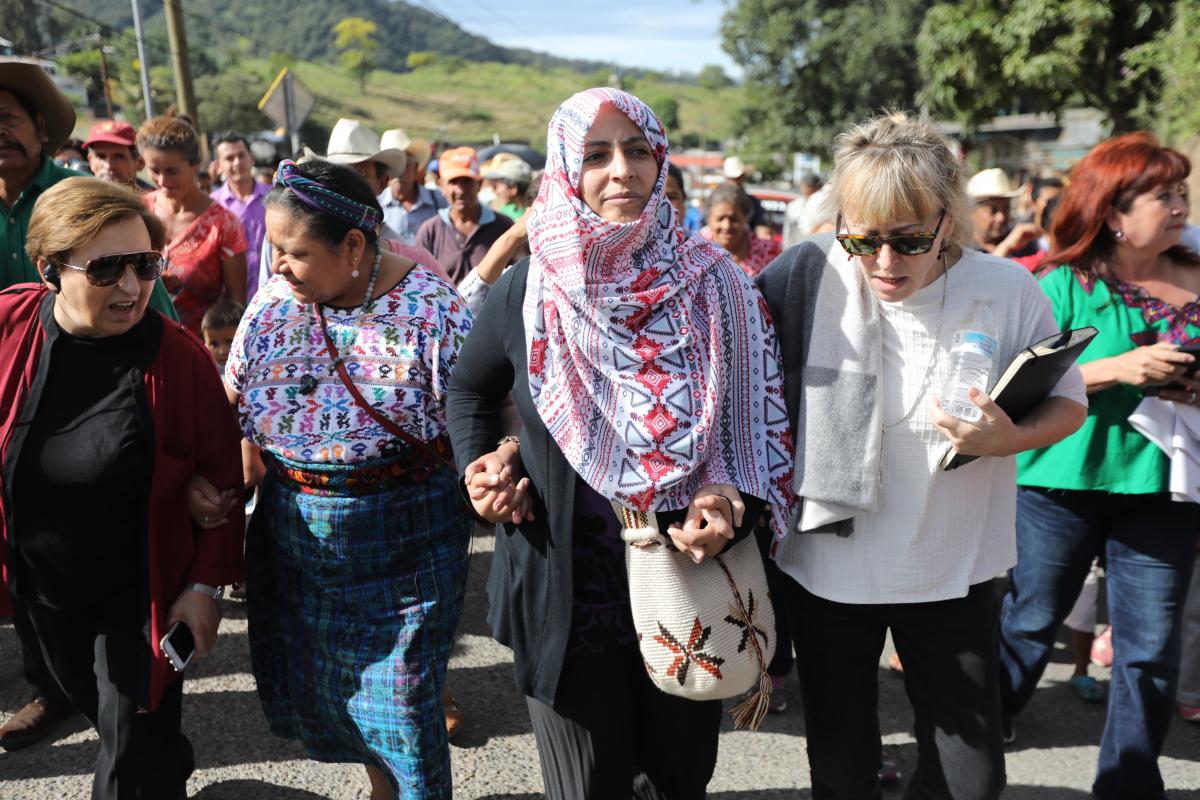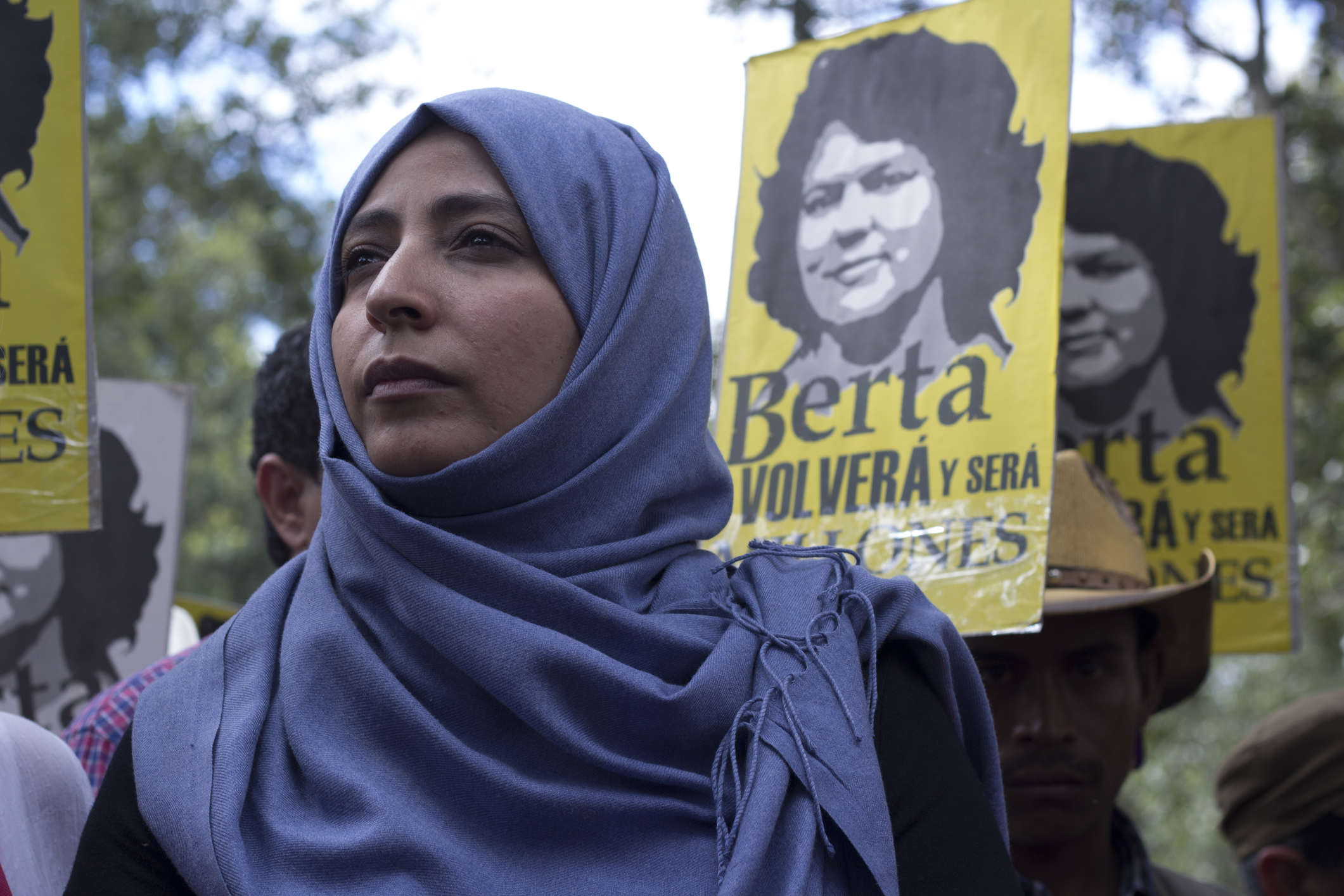For almost a decade, JASS has collaborated with numerous international, regional, and local partners such as the Nobel Women’s Initiative, COPINH, Fundacion Rigoberta Menchu, Movimiento de Mujeres Tz’ununija’, Resistencia Pacifica La Puya, and many more, to hear first-hand from indigenous and rural women leading the defense of land and territory against corrupt mining and extractive projects. In addition to longer-term, grounded efforts led by our in-country teams, these efforts took the form of two fact-finding missions to Honduras and Guatemala, plus a range of ongoing publications and advocacy campaigns to pressure decision-makers and increase visibility around issues such as indigenous rights, violence against women, land theft, corruption and impunity, and environmental degradation.
The Missions
The 2012 mission to Mexico, Honduras, and Guatemala established cross-border and cross-issue connections between frontline women defenders and influential decision-makers from Canada and the United States, which continue to shape advocacy and media today. Our collaborative efforts opened much-needed spaces for dialogue and relationship-building among seemingly different Mesoamerican women activists, their networks, and member of the delegation, which including Nobel Peace Laureates Jody Williams (USA) and Rigoberta Menchu (Guatemala), and JASS’ own Executive Director, Lisa Vene Klasen. Together, we set out to document:
- the violence and human rights crises in the region;
- the ways they specifically affect women;
- the incredibly courageous ways women organize in response.
Read about our findings in this 2012 report, Survivors to Defenders: Women Confronting Violence in Mexico, Honduras and Guatemala, and check out Women Crossing the Line is a three part mini-documentary series – developed in collaboration with the Nobel Women’s Initiative – that shares the voices of the women we met with throughout the 2012 mission. JASS co-hosted numerous briefings, meetings, and presentations of this report and video-series with U.S. congressional staff, State Department, U.S.-based human rights organizations and foundations.
On our latest mission in October of 2017, JASS, the Nobel Women’s Initiative, and our local allies brought together four women Nobel Laureates (Rigoberta Menchu Tum, Jody Williams, Shirin Ebadi, and Tawakkol Karman), journalists, and human rights leaders from Canada, United States, Honduras, and Guatemala, in a delegation to spotlight rural and indigenous communities which have become the frontlines of resistance, including:
- La Esperanza and Rio Blanco, Honduras: The site of a planned hydroelectric dam in Lenca indigenous territory. Indigenous resistance to the dam provoked the assassination of internationally-recognized indigenous activist, Berta Cáceres, in 2016. Members of her organization, COPINH, continue to face threats and smear campaigns for their outspokenness.
- El Escobal, Guatemala: The site of a Canadian silver mine, where corporate interests and local communities clash over the validity of the mining permit. This conflict has resulted in the killing of 44 people and 400 injuries, along with the sexual torture of women by security forces.
This 2017 mission brought an international light on the amazing courage and collective power that their resistance demands in the face of unspeakable violence and repression, especially how women within these movements and communities are standing up and speaking out.
Amplifying Through Visibility
The global stature of the high-profile participants of these delegations generated extensive media buzz, which we strategically used to give an international platform to the voices of rural and indigenous women. The delegation’s visibility took the form of hundreds of articles and media hits both at national and international levels, including feature articles in:
- National Observer: Honduran Women Pay for Rights with Their Lives (2018)
- The Guardian: ‘We lost a great leader’: Berta Cáceres still inspires as murder case takes fresh twist (2017)
- The Guardian: The Candian Company Mining Hills of Silver – and the People Dying to Stop it (2017)
- The Nation: These Women Nobelists Are Fighting for Grassroots Activists in Central America (2017)
- Press Release: End “War on Women” in Mexico, Honduras and Guatemala: Nobel Laureates (2012)
For the first time in the history of our work in Honduras, our staff reported a breakthrough of progressive narratives through local and national news barriers, which have in the past been harnessed by the government and corporations to criminalize human rights defenders, particularly women.
Influencing the Legal Debate
The substantial media attention also provided a key platform by which to promote the ongoing International Group of Expert Advisors’ (GAIPE) independent investigation of Berta Caceres’ murder, an initiative which JASS has supported and promoted since 2016. In October 2017, GAIPE released their report – pointing unequivocally to the role of DESA executives and members of the Honduran government and military in the plot to murder Berta. JASS has continuously accompanied COPINH through the launch of the report and attended numerous promotional events, co-hosting a briefing to the U.S. Congress in late 2017.
On the 2-year anniversary of her death, a series of protests and urgent actions around the world, but particularly in Honduras, led to the arrest of ex-Honduran military intelligence officer and DESA executive, David Castillo. Castillo is the first individual to be charged as an intellectual author of Berta’s assassination.
The 2017 mission similarly shone an international spotlight on an unprecedented lawsuit in Canadian courts, whereby 11 indigenous Guatemalan women are suing a Canadian Mining Company for sexual torture at the hands of security forces. The #WomenLandPeace team visited El Escobal, the site of the mining project in question, to hear the testimonies of women, participate in a demonstration, and voice solidarity with their cause via a press conference.
Knowledge and Learning
Stay tuned for more upcoming publications, including an informational video documenting the 2017 mission and examining the ever-changing context of human rights in Mesoamerica. Please visit the website of our co-organizers, the Nobel Women’s Initiative, to view their related resources and photo galleries. Also, check back to our 2012 delegation videos, report, pictures, and more.



























